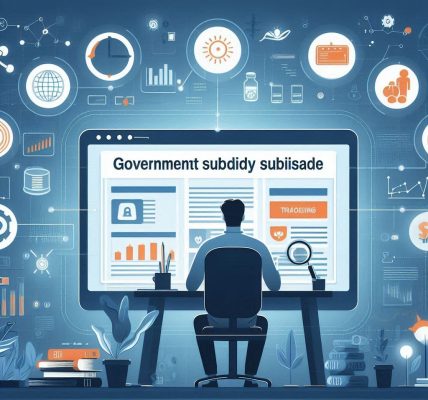Introduction
Government subsidies play a crucial role in supporting individuals, businesses, and industries, helping them overcome financial constraints. In India, the government has introduced various schemes that provide tax benefits and rebates, designed to encourage people to invest in sectors like agriculture, housing, energy, education, and more. These benefits are aimed at boosting economic growth while ensuring equitable development across all income groups. This article will dive deep into the tax benefits and rebates under government subsidy programs, guiding you on how to leverage these incentives to save money, reduce tax liabilities, and benefit from financial assistance.
What Are Tax Benefits & Rebates in Government Subsidy Programs?
Tax benefits and rebates are provisions provided by the government that help reduce an individual’s or business entity’s tax liabilities. These benefits are typically available through subsidy schemes, which can be related to various sectors such as housing, healthcare, education, renewable energy, and small businesses.
- Tax Benefits: These are reductions in the amount of tax you owe, allowing you to save money by either lowering your taxable income or reducing the rate at which you are taxed.
- Tax Rebates: A rebate is a refund or a reduction in tax owed. In government subsidy programs, rebates usually apply directly to the amount of tax you owe based on eligibility and specific criteria.
These benefits are not only beneficial for taxpayers but also encourage the growth of sectors that are essential for national development.
Key Government Subsidy Programs Offering Tax Benefits and Rebates
1. Pradhan Mantri Awas Yojana (PMAY) – Tax Benefits on Home Loans
Objective: PMAY offers affordable housing solutions to individuals belonging to the Economically Weaker Section (EWS), Low Income Groups (LIG), and Middle Income Groups (MIG). It provides subsidized loans for purchasing or constructing homes.
Tax Benefits:
- Section 80C of the Income Tax Act allows deductions for principal repayment of home loans up to ₹1.5 lakh.
- Section 24(b) provides an additional deduction of up to ₹2 lakh for the interest paid on home loans under PMAY.
- Additional Deduction for First-Time Homebuyers: Under PMAY, eligible first-time homebuyers can avail of additional tax benefits on home loan interest.
Eligibility:
- Beneficiaries must belong to the EWS/LIG/MIG categories.
- The property should be the first house of the applicant.
How to Apply:
- Applications can be made through the PMAY portal or through your bank for home loan subsidies.
2. Pradhan Mantri Ujjwala Yojana (PMUY) – Subsidy on LPG Connections and Tax Benefits
Objective: PMUY provides free LPG connections to women from Below Poverty Line (BPL) families, ensuring cleaner cooking methods and reducing the health hazards caused by traditional fuels.
Tax Benefits:
- While PMUY itself does not directly offer tax benefits, individuals purchasing LPG stoves and gas refills can claim deductions under Section 80E for interest on loans taken for purchasing LPG equipment.
Eligibility:
- The beneficiary must be a woman from a BPL family as per the Socio-Economic Caste Census (SECC).
How to Apply:
- Eligible families can apply for the subsidy at LPG distributors or the PMUY website.
3. Solar Power Subsidy Schemes – Tax Benefits for Renewable Energy Investments
Objective: India’s government is keen on promoting renewable energy to reduce the country’s carbon footprint. The solar energy subsidy scheme offers financial support to individuals and businesses for the installation of solar power systems.
Tax Benefits:
- Under the Income Tax Act, individuals can claim deductions under Section 80-IA for investments in renewable energy generation, including solar energy.
- Depreciation Benefit: Individuals and businesses investing in solar power systems can claim 100% depreciation under Section 32 of the Income Tax Act, which helps in reducing the tax burden.
Eligibility:
- Available for individuals, households, and businesses opting for solar panel installation in residential or commercial buildings.
How to Apply:
- Applications can be made through the Ministry of New and Renewable Energy (MNRE) website or via accredited agencies.
4. Tax Benefits for Startups – Startup India Scheme
Objective: The Startup India Scheme was launched by the Indian government to foster entrepreneurship by offering a range of benefits, including tax exemptions, reduced compliance costs, and easy access to funding.
Tax Benefits:
- Tax Exemption for 3 Years: Under the Income Tax Act, startups can avail of a 100% tax exemption on profits for the first 3 years of operation.
- Capital Gains Tax Exemption: Investments made by angel investors in startups are eligible for tax exemptions under Section 54GB of the Income Tax Act.
- Tax Rebate on Shareholder Investments: Shareholders of eligible startups can claim tax exemptions on their investments in the startup under the scheme.
Eligibility:
- A startup must be incorporated as a Private Limited Company or Limited Liability Partnership (LLP).
- The startup should be in the technology-driven or innovative sector.
How to Apply:
- The application process is done via the Startup India Portal, where startups can register and apply for tax exemptions and other benefits.
5. National Pension Scheme (NPS) – Tax Benefits for Retirement Savings
Objective: The National Pension Scheme (NPS) provides a retirement savings option to individuals in both the public and private sectors.
Tax Benefits:
- Section 80C provides deductions of up to ₹1.5 lakh for contributions made towards the NPS.
- Section 80CCD(1B) allows an additional deduction of up to ₹50,000 for contributions to the NPS.
- Exempt from Tax on Accumulated Corpus: The amount received after retirement is partially exempt from tax under Section 10(12A) of the Income Tax Act.
Eligibility:
- Any individual between 18 and 60 years of age can apply.
- Applicable to both self-employed and salaried individuals.
How to Apply:
- To apply, you need to visit the NPS portal or approach any bank branch that provides NPS services.
How to Make the Most of Government Tax Benefits & Rebates
1. Stay Informed About Available Schemes
Many tax benefits are linked to specific schemes launched by the government. Make sure you stay updated on the latest schemes and deadlines. Regularly check government portals or speak to a financial advisor who can help you identify the most beneficial schemes for your financial situation.
2. Keep Track of Necessary Documents
For smooth application and claiming benefits, ensure you maintain necessary documents, such as:
- Aadhaar card
- Income proof (salary slip, bank statement, etc.)
- Investment receipts (for solar power, PMAY, etc.)
- Loan-related documents
3. Seek Professional Help if Necessary
Taxation can be complex, especially when dealing with subsidies and rebates. Consider consulting a tax professional or a financial advisor to ensure you’re making the most of available tax benefits.
Conclusion
Government subsidies and tax benefits are powerful tools designed to alleviate financial burdens, encourage investment, and promote national growth. Whether you’re buying a house, installing a solar panel, starting a business, or saving for retirement, these programs offer significant support. By understanding the schemes and making informed decisions, you can leverage these benefits to lower your tax liabilities and improve your financial situation.
Before applying, always check the eligibility criteria and gather the necessary documents to ensure a seamless application process. Tax benefits under government subsidies are an excellent way to achieve financial stability and growth, so take advantage of them wherever possible.




